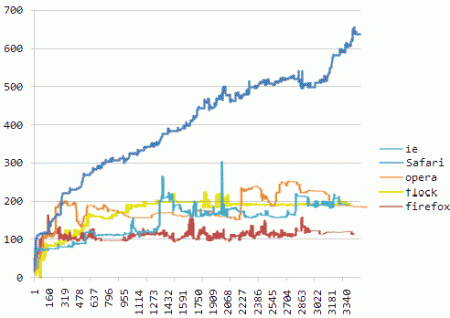Testing memory efficiency with popular browsers
A curious test of popular browsers was made by Sam Allen, the results of which are posted on the Dot Net Perls website. He wondered about browser performance using memory. To do this, Sam wrote an application that fixed every few seconds the amount of memory used by the browser, after which the author walked over the Internet for over a dozen hours and collected statistics on the effectiveness of browsers.
The results were as follows:

Thanks to deerua, all graphics can be visually compared:

')
Beg abbreviated retelling of the author of the test:
The final conclusion of the author: “It’s not a problem.” Windows. " Which generally means that the author prefers Firefox 3.0, as the most effective in terms of memory usage.
In my opinion, this testing is one of the very few that have anything to do with the actual use of browsers. In difference, for example, from the speed of javascript execution, the efficiency of browsers in using memory is a more noticeable thing for the user.
The results were as follows:

Thanks to deerua, all graphics can be visually compared:

')
Beg abbreviated retelling of the author of the test:
- Safari for Windows shows very poor memory efficiency;
- Firefox 3.0 - this browser uses less memory than others;
- Flock (based on Firefox 2.0) - manages memory well and can be used for a long time without any problems;
- Opera 9.5 - at the level of Flock;
- Internet Explorer 8 Beta 1 - showed itself well, but there is an alarming dynamic, in any case, the browser normally supports continuous use.
The final conclusion of the author: “It’s not a problem.” Windows. " Which generally means that the author prefers Firefox 3.0, as the most effective in terms of memory usage.
In my opinion, this testing is one of the very few that have anything to do with the actual use of browsers. In difference, for example, from the speed of javascript execution, the efficiency of browsers in using memory is a more noticeable thing for the user.
Source: https://habr.com/ru/post/28034/
All Articles